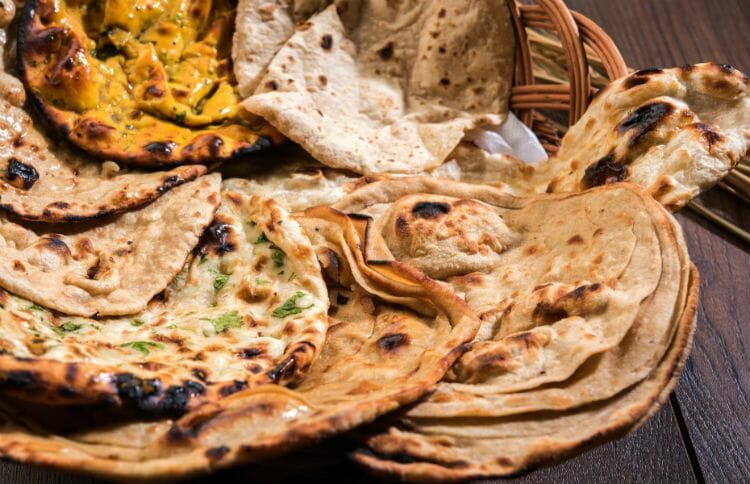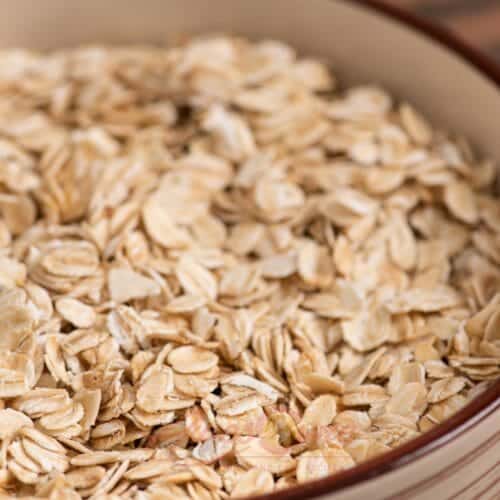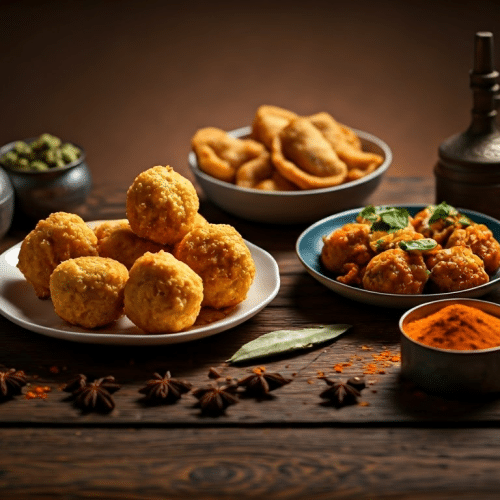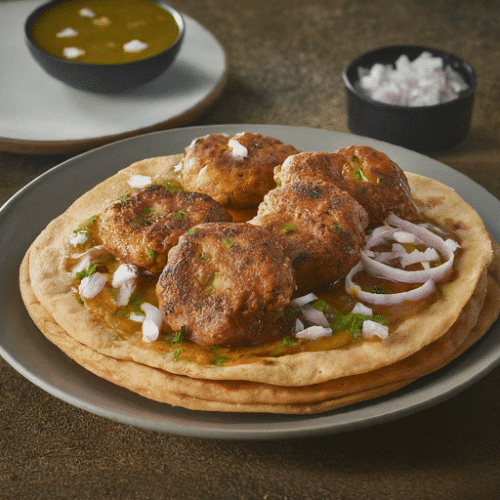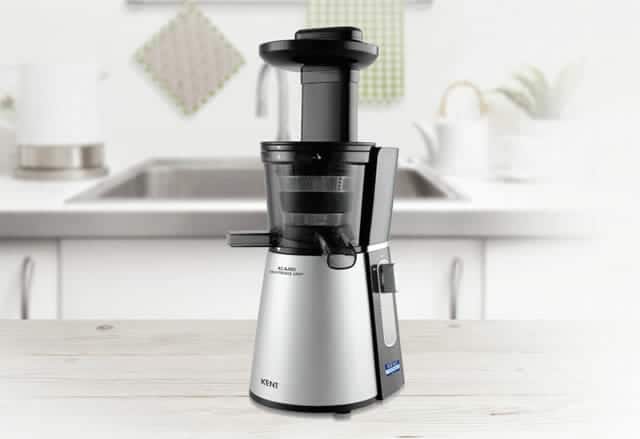Are you looking to boost your energy levels, support muscle growth, and maintain a healthy weight? If so, then protein-rich foods should be at the top of your shopping list! Whether you’re an avid gym-goer or simply want to improve your overall diet, understanding the role of protein is key. From delicious animal-based options to nutritious plant-based sources, there’s a wealth of protein-packed foods waiting for you.
Adopting a vegetarian or vegan diet is not just a lifestyle choice nowadays; it’s becoming a health imperative for many. This guide will walk you through everything about these vital nutrients—so get ready to discover how incorporating more protein into your meals can transform your health and well-being!
Importance of Protein for Vegetarians
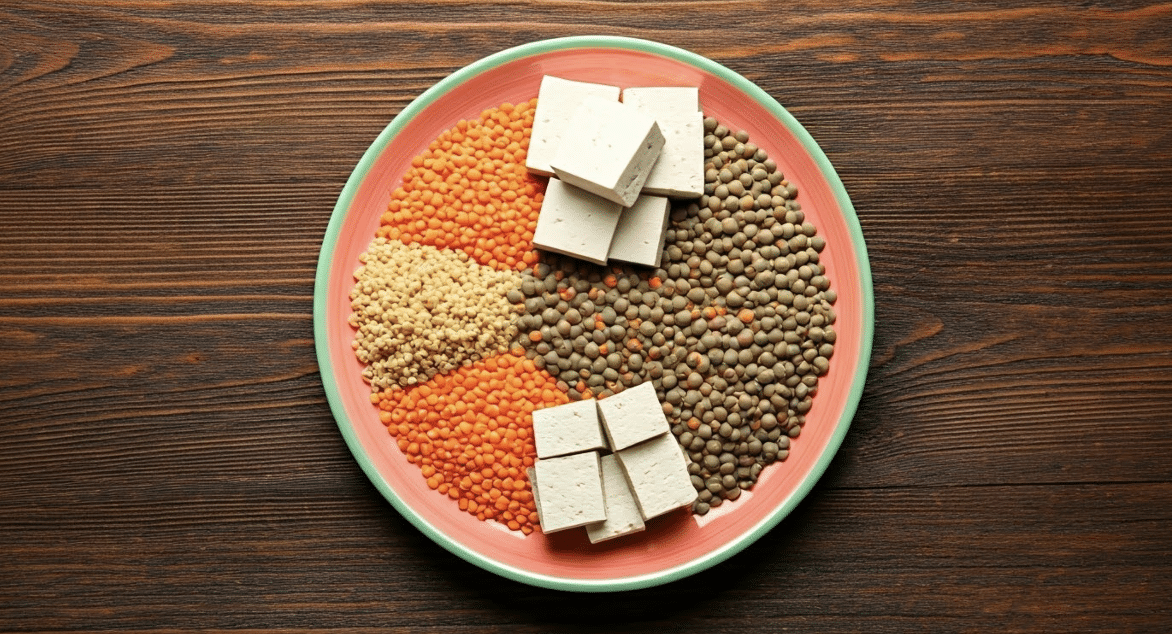
A plate with a variety of plant based protein sources including tofu and different types of lentils
Protein is a fundamental building block of life. It plays a crucial role in the body’s growth, repair, maintenance, and overall human health. Every cell relies on proteins to function correctly. This macronutrient aids in muscle development and recovery, making it essential for athletes and those who lead active lifestyles. Beyond physical health, protein influences hormonal balance and supports immune functions.
A diet rich in protein helps keep you feeling full longer. This can be especially beneficial for weight management by curbing cravings throughout the day. Moreover, proteins are made up of amino acids—some of which your body cannot produce on its own. These essential amino acids must come from your food choices to maintain optimal health.
Incorporating adequate amounts of protein into daily meals ensures that you’re fueling your body with what it needs for energy, stamina, and overall wellness.
You can also read: Best high-protein Indian Breakfast Ideas.
Top Protein-Rich Vegetarian Foods
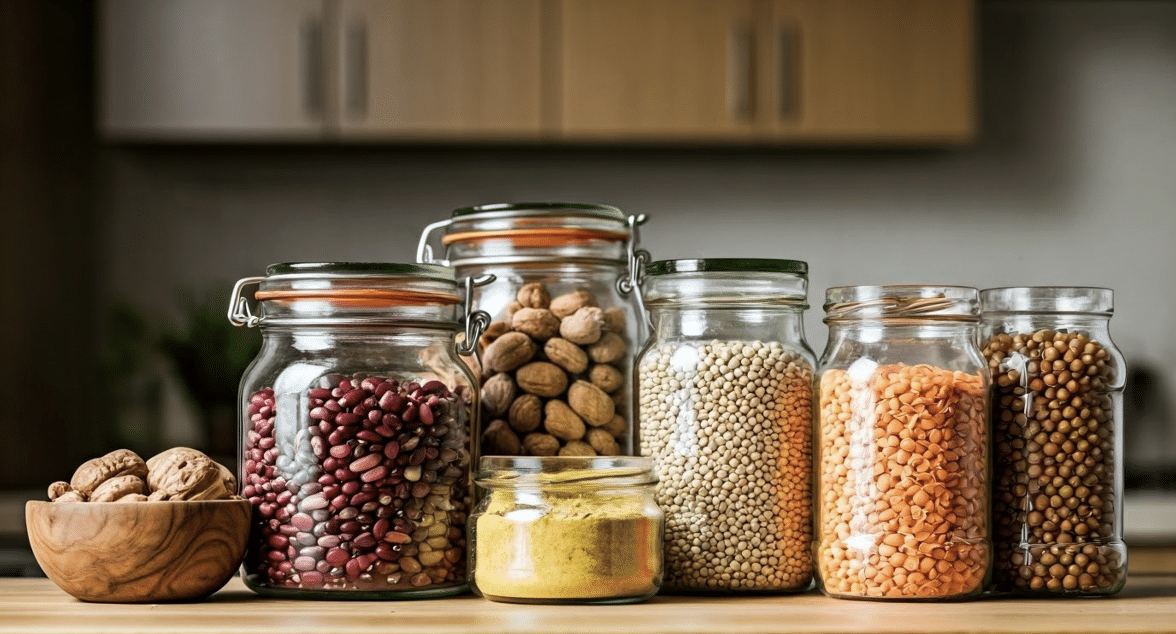
A collection of glass jars filled with various dried beans lentils nuts and seeds
While meat, poultry, and fish are excellent sources of protein, vegetables, grains, legumes, nuts, and seeds can be just as effective for vegetarians and vegans. These plant-based foods serve as powerhouse sources of protein and other essential nutrients. Non-dairy alternatives are also excellent choices for meeting daily protein requirements.
Legumes and lentils
Legumes and lentils, often used interchangeably, are plant foods that are not only rich in protein but also high in fibre and various vitamins and minerals. Here are some examples:
- Chickpeas: With about 14.5g of protein per cup, chickpeas are a protein powerhouse. They are versatile and can be used in salads, stews, and hummus.
- Lentils: A single cup of cooked lentils provides 18g of protein, making it a great addition to soups, salads, and curries.
- Mung beans: These tiny green beans are packed with protein (approx. 14g in one cooked cup) and are a good source of dietary fibre. They are used in Indian and Asian cuisine.
- Kidney beans: They are high in protein (approx. 15g per cooked cup) and are also rich in complex carbs and fibre. They are commonly used in chilli, stews, and salads.
- Black beans: Besides protein (approx. 15g per cooked cup), black beans are loaded with fibre, potassium, folate, and vitamin B6.
Check out our collection of delicious Indian dal recipes and bring authentic flavours to your kitchen!
Tofu, tempeh, and edamame
Tofu, tempeh, and edamame all originate from soybeans and are excellent plant-based protein sources:
- Tofu: Known as bean curd, tofu contains about 10-16g of protein per half-cup serving. Its bland taste enables it to absorb flavours from other ingredients, which makes it versatile.
- Tempeh: Made by fermenting cooked soybeans, tempeh packs around 15g of protein per half-cup serving. It has a nutty flavour and firm texture, making it ideal for stews and stir-fries.
- Edamame: Edamame are immature soybeans that are green in colour. One cup of cooked edamame provides nearly 17g of protein.
- All these soy products are considered whole sources of protein, meaning they provide the body with all the essential amino acids it needs. They are also rich in various other nutrients like iron, calcium, and magnesium.
Discover delicious tofu recipes that are perfect for adding healthy, flavourful meals to your table!
Seitan
Seitan, made from gluten, is a popular protein source for vegetarians and vegans, and it is known for its meat-like texture. With nearly 25g of protein per 3.5 ounces, it’s one of the richest plant-based proteins. It’s also a good source of selenium and contains small amounts of iron, calcium, and phosphorus. However, people with gluten-related disorders should avoid it.
Quinoa and amaranth
Quinoa and amaranth are nutrient-dense pseudo-grains that provide 8 to 9g of complete protein per cooked cup, containing all nine essential amino acids. They’re also rich in complex carbs, fibre, iron, magnesium, and other minerals. Their high protein and fibre content help promote fullness, making them great choices for weight loss. Quinoa’s fluffy texture is a good rice or couscous substitute, while amaranth’s earthy flavour works well in salads, soups, breads, pancakes, and even desserts.
Nuts and seeds
Nuts and seeds are great additions to a vegetarian or vegan diet due to their high protein content and other beneficial nutrients:
- Almonds: Offering around 6g of protein per ounce, almonds come packed with healthy fats, fibre, vitamin E, and magnesium.
- Walnuts: Each 1-ounce serving of walnuts provides 4.3g of protein, along with valuable amounts of alpha-linolenic acid, a type of plant-based omega-3.
- Hemp seeds: These seeds are a complete protein source, providing 9g of protein per 3-tablespoon serving. They also offer an optimal ratio of omega-6 to omega-3 fatty acids.
- Chia seeds: Known for their gel-forming property when mixed with liquids, these tiny seeds have 5g of protein per ounce.
- Sesame seeds: Though small in size, sesame seeds pack a protein punch with 5g per ounce. They also contain high amounts of calcium and magnesium.
Nutritional yeast
Nutritional yeast, or “nooch,” is a deactivated yeast popular for its cheesy flavour, especially among vegans and vegetarians. It comes as yellow flakes or powder and can be added to popcorn, pasta, or baked goods. Beyond its taste, it’s a nutritional powerhouse, offering 8g of protein, 3g of fibre, and a good amount of B vitamins, including B12, which is particularly helpful for vegans.
Black-Eyed Peas
Black-eyed peas are a great plant-based protein source, offering around 12 grams of protein per cooked cup. They also provide fibre, iron, folate, copper, and manganese. Versatile in dishes like salads, stews, curries, and dips, they’re an easy way to boost protein and add flavour to your meals.
You can also check out this black eyes peas recipe.
Unsweetened Cocoa Powder
Unsweetened cocoa powder provides about 1 gram of protein per tablespoon, making it a surprisingly good source of this macronutrient. While small, this adds up over time. Plus, cocoa powder is rich in antioxidants that support heart health and reduce inflammation. Try adding it to smoothies or oatmeal for a protein-packed, nutritious boost.
Spirulina
Spirulina is a nutrient-dense blue-green alga, offering about 8 grams of complete protein per two tablespoons. It also provides significant amounts of iron, copper, B vitamins, antioxidants, and more. Some studies suggest it may have anti-inflammatory and anti-cancer benefits. Add spirulina powder to smoothies and juices, or sprinkle it on meals for a quick nutritional boost.
Plant-Based Dairy Alternatives
With the rise of plant-based diets and growing concerns about animal welfare and sustainability, more and more people are turning to plant-based dairy alternatives. These products not only offer a guilt-free alternative to traditional dairy but they are also packed with protein.
Soy milk and cheese
Soy-based dairy alternatives, like soy milk and cheese, are protein-rich substitutes for regular milk and cheese. An 8-ounce cup of soy milk provides 6-7 grams of protein, similar to cow’s milk, along with dietary fibre, vitamins, and minerals. Their creamy texture and mild flavour make them versatile for use in cereals, coffees, smoothies, pasta, sandwiches, and vegan pies.
Other non-dairy milks
There are other non-dairy milk alternatives apart from soy, each with its unique nutritional profiles. Some popular choices include:
| Non-Dairy Milk | Protein content per 8-ounce serving |
| Almond Milk | Around 1 gram |
| Oat Milk | Between 2 and 4 grams |
| Hemp Milk | About 3-5 grams |
| Pea Milk | Around 8 grams |
| Rice Milk | Typically less than 1 gram |
| Coconut Milk | Typically less than 1 gram |
While almond, rice, and coconut milk are lower in protein, they can still be part of a balanced diet when consumed with other high-protein foods. Oat, hemp, and particularly pea milk have higher protein content, making them good choices for people seeking to increase their protein intake.
Dairy-Free Yoghurt
Dairy-free yoghurts made from almond, cashew, soy, or coconut milk are a nutritious option for those following a vegan diet or reducing animal products. They often provide similar (or more) protein than Greek yoghurt and are typically enriched with probiotics, calcium, vitamin D, and B12. Whether enjoyed plain, mixed with fruit, or added to smoothies, dairy-free yoghurt is a great addition to any plant-based diet.
Protein-Rich Vegetables and Fruits
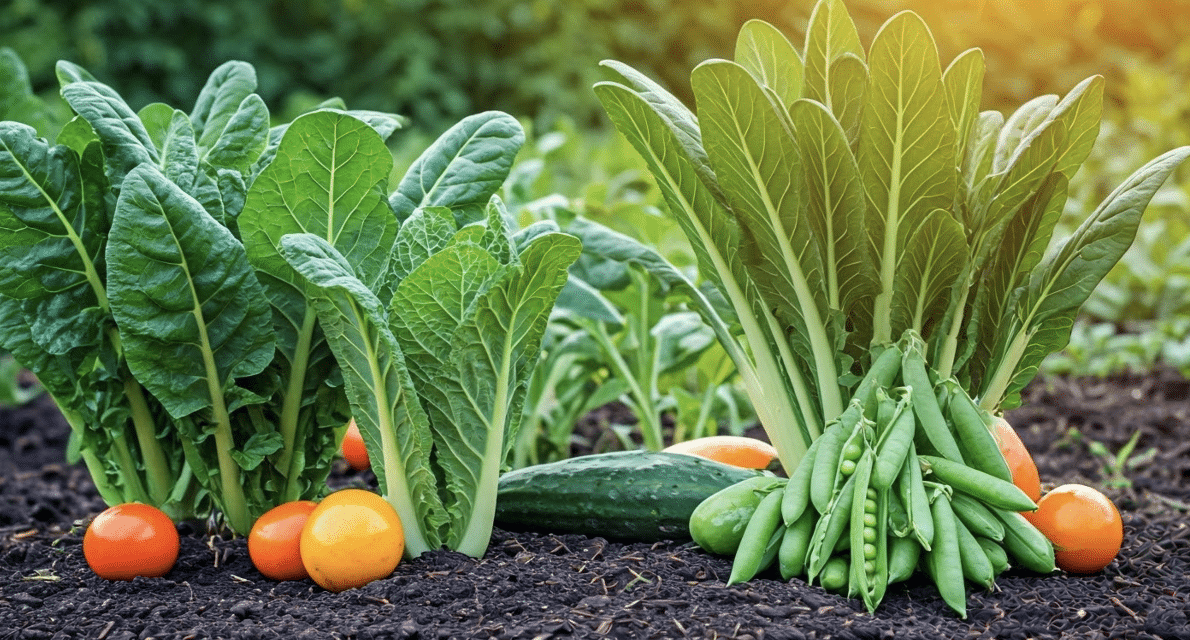
A variety of fresh vegetables growing in a garden including tomatoes cucumbers peas and leafy greens
When it comes to protein-rich foods, most people tend to think of meat and poultry as their main sources. However, there are actually plenty of protein-packed vegetables and fruits that often get overlooked. These plant-based options not only provide a substantial amount of protein, but they also come with additional health benefits such as fibre, vitamins, and minerals.
Leafy greens
Leafy greens like spinach and kale provide 2 to 5 grams of protein per cooked cup, along with iron, calcium, fibre, antioxidants, and essential vitamins. Their nutrient density and low-calorie content make them a great addition to any diet. Enjoy them in salads, smoothies, stir-fries, or as a base for your main dish.
Green peas and edamame
Green peas and edamame are both protein-rich options. A cup of green peas provides 9 grams of protein, more than a cup of milk, while a serving of edamame offers up to 18 grams. In addition to protein, both are high in vitamins, minerals, and fibre. Enjoy green peas in salads, soups, or stews, and snack on edamame or add it to salads and grain bowls.
Want to check out Green peas recipes? Check it out here.
High-protein fruits
While fruits aren’t known for being high in protein, some offer modest amounts. For example, guava provides 4.21 grams per cup, avocados offer 3 grams per half, and apricots, blackberries, and nectarines each have around 2 grams per cup. These fruits are also rich in vitamins and antioxidants, making them a nutritious addition to your diet. Enjoy them as snacks, in salads, smoothies, or as toppings for cereals, oatmeal, or yoghurt.
Sample Vegetarian Protein-Rich Meal Plans
To sneak in more protein into your vegetarian diet, here are some meal plan ideas you might find handy:
- Breakfast: A bowl of oatmeal topped with a handful of almonds and chia seeds or a tofu scramble with spinach, bell peppers, and onions.
- Mid-Morning Snack: A homemade smoothie made with almond milk, a scoop of plant-based protein powder, and mixed berries.
- Lunch: A quinoa salad with chickpeas, cucumber, cherry tomatoes, olives, and crumbled vegan feta dressed with olive oil and lemon juice.
- Afternoon Snack: Carrot and celery sticks paired with hummus for dipping or a handful of roasted edamame.
- Dinner: Stir-fried tempeh and vegetables over brown rice or chickpea curry with whole grain flatbread for dipping.
- Dessert: A bowl of dairy-free yoghurt topped with a sprinkle of granola and fresh fruits.
Conclusion
A well-planned plant-based diet, whether vegetarian or vegan, can easily meet your protein needs. Key sources include legumes, whole grains, nuts, seeds, dairy alternatives, and protein-rich fruits and vegetables. The key is variety to ensure you get all the essential amino acids and other nutrients. It’s not just about hitting your protein target but maintaining a balanced diet for overall health. If you’re making significant dietary changes, it’s a good idea to consult with a healthcare provider or nutritionist, especially if you have specific health concerns. A plant-based, protein-rich diet offers both health benefits and a chance to explore the variety of foods nature provides.
Frequently Asked Questions
How can a vegetarian get enough protein?
Vegetarians can meet their protein needs by including a variety of whole grains, legumes, nuts, seeds, vegetables, dairy alternatives, and protein-rich fruits in their diet. Combining different protein sources throughout the day can also ensure the intake of all essential amino acids needed for bodily functions.
What is the recommended daily intake of protein?
The recommended daily protein intake is 0.8 grams per kilogram of body weight for healthy adults, or about 56 grams for men and 46 grams for women. Needs may vary for pregnant or breastfeeding women, as well as those with specific medical conditions or higher activity levels.
Are plant-based protein powders necessary for vegetarians?
While plant-based protein powders can boost protein intake, they’re not necessarily required for vegetarians who consume a varied and balanced diet rich in whole foods. However, they could be beneficial for those who struggle to meet their protein needs through food alone.
How can I incorporate more protein-rich vegetables into my meals?
Protein-rich vegetables like green peas, spinach, broccoli, and kale can easily be incorporated into your meals. Add them to salads, stir-fries, soups, or smoothies. You can also use them as a base for dishes like tofu scramble and vegetable curries.
Are there any complete plant-based protein sources?
Yes, several plant-based foods are deemed complete proteins, meaning they contain all nine essential amino acids. These include quinoa, buckwheat, soy (including tofu and tempeh), hemp seeds, chia seeds, and spirulina.
How to get 70g of protein a day as a vegetarian?
To reach 70g of protein a day, include protein-rich foods in all your meals and snacks. Pair whole grains with legumes, top your salads with chickpeas or baked tofu, sneak in some nuts into your morning oatmeal, and consider a scoop of plant-based protein powder in your smoothie.
Does dal have protein?
Yes, lentils or ‘dal’ are loaded with protein. A cup of cooked lentils provides approximately 18 grams of protein. They’re also rich in fibre and various vitamins and minerals, making them a nutritious addition to a vegetarian meal.








